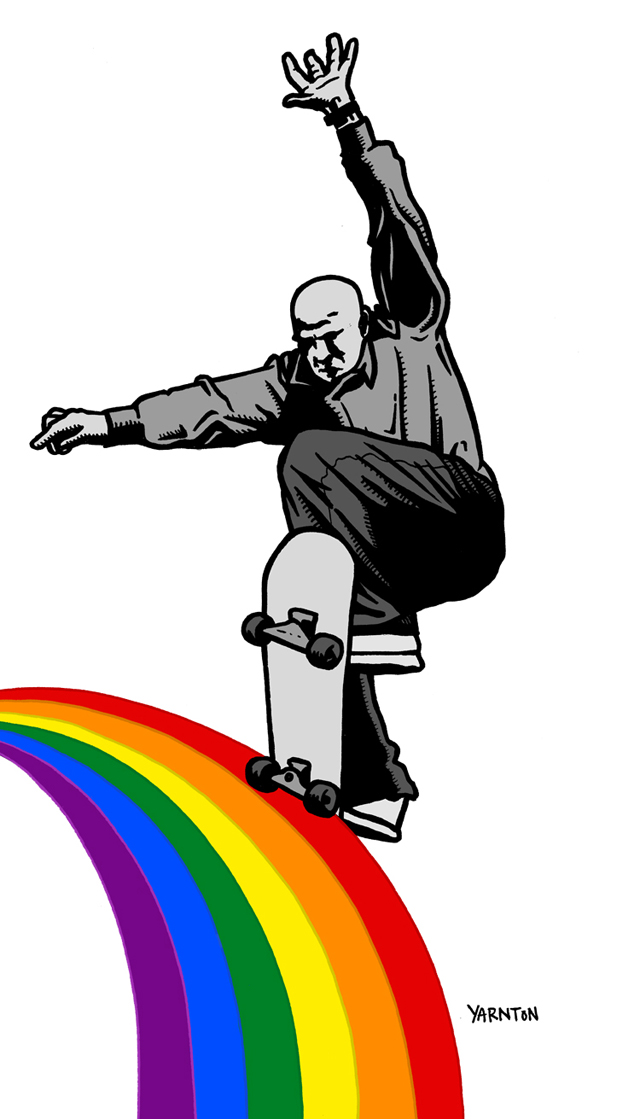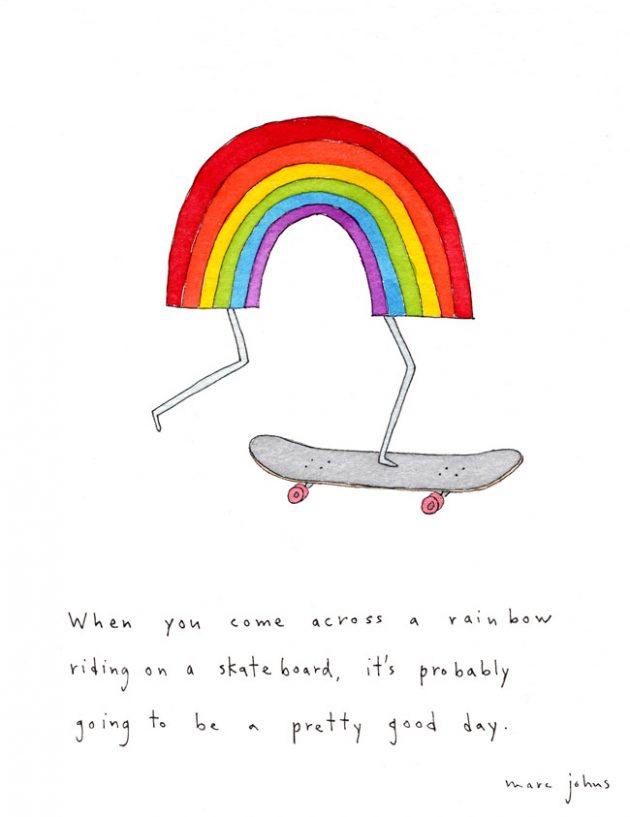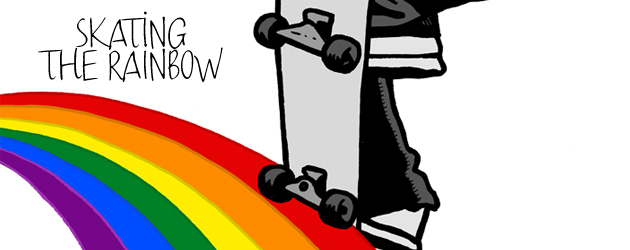
Brian Anderson’s decision to come out has been met with support and affection across that slice of internet lacquered thick with skateboarding. In addition, joining Antihero, that most manly, broken-toothed, gun shootin’, hill bombin’, beer sluggin’, say-it-like-it-is and shut-up-and-skate of all teams, couldn’t be more perfect. Surely the homophobia that has lingered in skateboarding like a drug-resistant superbug can’t survive in this environment.
The idea that things were once worse and now, perhaps, are better has been explored in brilliant pieces for Jenkem and Huck (the latter written by Patrick Welch, who five years earlier highlighted the injustice suffered by 1990s Birdhouse am Tim Von Werne, whose career finished before it started after being told not to speak about his sexuality to Skateboarder magazine). But when Toy Machine’s Welcome to Hell was brand new and BA frontside bluntslid into stardom, this would likely have all met with significant amounts of homophobic dumbfuckery.
To spell it out to the few today who miss the point to the tune of “who cares?”, a skateboarder being gay shouldn’t matter but clearly does. If someone possessed of such enormous capital (Skater of the Year, World Cup winner, a big giant of a man respected by salty ol’ peers and board-purchasing kids) still had to go through years of anxiously guarded privacy, what messages has skateboarding been transmitting more widely?
When we asked Marie Dabaddie, a skater, photographer and founder of genderqueer skatezine Xem Skaters, Marie felt that, “skateboarding has never been welcoming for gay people in general.” With everything skateboarding purports to be – non-conformist, creative, better than narrow-minded squares in the ordinary world – the idea that gay people are either dissuaded from skateboarding or that gay skaters feel less able to come out is deeply disappointing. For Marie, BA’s announcement means “people are going to talk about it, and it might help gay people feel more confident to come out in the skateboard community, or even to start skateboarding…I just think that being gay shouldn’t be such a big thing anymore but I guess it still is.”
And of course everything is not now suddenly OK in our little world. As Patrick Welch puts it, skateboarding shouldn’t let itself ‘off the hook’ for decades of excusing prejudice (including violent prejudice). At a micro level, listening to the self-admonishment and motivational abuse that carries thickly and loudly across skateparks and street spots shows that homophobia and misogyny remain stubbornly sealed into our everyday ‘vernacular’. Ordinary skaters have little power over Californian skate moguls closing ranks to protect stars such as D Way or the late Jay Adams (RIP) from serious scrutiny into their roles in potentially homophobic, fatal assaults (Way was never charged for his alleged involvement in the death of a gay man for which his friend, Josh Swindell, served 19 years, whilst Adams served six months for felony assault after starting a fight with a gay couple, one of whom was beaten to death). We do, however, have power over the language we use.
This leads to several tricky questions. Are older skaters projecting how they once talked onto the young – to whom this no longer appliers, what with 20 years of progress n’ all? If ‘gay’, ‘fag’, ‘pussy’, etcetera are still habitually used to signify ‘weak’ or ‘bad’, do the small minority who think deeply, write and tweet about such things (and we are firmly within this group, ‘checking our privilege’ as we go) risk over-earnestly policing language that has been long separated from its original cruel intent?
Sources like the British Social Attitudes Survey indicate that the population as a whole has become much more tolerant of difference in sexual orientation. But there is a difference between stated and revealed prejudice: how we describe ourselves versus what we then say and do. Tour bus chatter made BA fear how peers would react if they knew he was gay. Presumably those individuals would never have viewed themselves as prejudiced. The use of such language may be thoughtless, but the consequence is to ‘other’ people who differ from the ‘heteronormative’, male-centric assumptions of skateboarding.
What the skate-o-sphere has got absolutely right is that this is bigger than skateboarding. Derogatory slang is used throughout our school and teenage years, generation after generation, its origins stretching from Chaucer to Orwell to Chris fucking Moyles. We may not be any worse than wider society, but we are surely no better. Paraphrasing Kyle Beachy, each chauvinistic cuss cumulatively results in an “act of violence” to anyone who is not a heterosexual male.
BA put the harm done by the habitual use of the word ‘faggot’ into historical context for Kevin Wilkins at The Good Problem: “It’s a really horrible word. I think a lot of older gay people really think nobody should ever say it…kids just don’t know how hurtful it really is. It’s a term these kids all use, but they didn’t grow up in the times of the 60s and 70s when being gay was illegal and when gay bars were being raided. They didn’t live through the 80s and the AIDS epidemic, where some people were losing a friend a week. Just think about what you’re really saying.”
As well as projecting hostility to gay men, this language sends a very similar message to women and girls. BA may be the first openly gay male top tier pro, but many gay female professionals have been out from the start. In this case, skate culture has much in common with the wider world of sport, where sponsors and pundits evaluate male athletes against masculine clichés of strength and power and female athletes according to the sexualised male gaze. Female participation in skateboarding has grown considerably, but a strange consequence of the particularly hyper-masculine nature of skating is that, for women who skate, being gay isn’t actually a big deal: quite the opposite, it’s sometimes assumed by other skaters. Any woman or girl skater is already ‘other’, exactly because she is doing something than projects itself as exclusively male. Skate comps backed by major ‘action sports’ sponsors remind us of this skewed hierarchy by accompanying male prize winners with scantily clad hostesses whilst often failing to include female competitors.
On this counter-intuitive jumble of attitudes towards gender and sexual orientation, Marie observes that: “Female skaters have always been suspected of being gay somehow. If you’re a skater and a girl, you might as well be gay because you’re skating and ‘skating is for men’ so ‘you’re playing the man’. It’s a stupid cliché that probably made it easier for women who are homosexual to live in skateboarding. Not that it’s easy at all, it’s just not such ‘A Thing’ anymore.”
With reference to the mainstream sports stars who came out some time ago, articles on BA have posited that skateboarding lags behind even the retrograde world of ‘proper sports’. But these are exceptional cases: even in mass participation sports, there are far fewer out gay athletes than the proportion of LGBTQ people in wider society would lead one to expect. The UK’s ‘national sport’ of football presents one of the saddest stories. Justin Fashanu came out in 1990 in a tabloid interview after lengthy press speculation and abuse from fans. No club would subsequently offer him a full-time contract. He took his own life in 1998, following an allegation of sexual assault in the US State of Maryland (where homosexual acts were at that time illegal). His suicide note expressed his doubts that he’d receive a fair trial because of his sexuality. He remains the only English premiere league player to have come out whilst still playing professional football.

Systemic prejudice harms men and women of all sexual orientations and gender identities, which Marie describes as part of a damaging and “ceaseless genderisation”. The journalist Owen Jones relates the mental health crisis facing young people to these deeply entrenched forces: “A rigid and unreconstructed form of masculinity is enforced, sometimes brutally, in the playground. Boys deemed to be insufficiently manly face being abused as ‘girls’ or ‘gays’. Speaking about mental distress is certainly not seen as ‘manly’ – it is ‘weak’.” This is linked to the terrible fact that suicide is the main killer of men under 45 in the UK. For women, equally rigid assumptions of femininity play out particularly in pressures to conform to unobtainable body images and expectations of total male agency over sexual gratification – shockingly revealed amongst a supposedly more enlightened younger generation in the current spike in sexual assault and harassment on university campuses in both the UK and US.
Skateboarding can make small differences to this bigger picture. In case you haven’t noticed, it is so hot right now. Palace’s inventive mashing of cockney and Jamaican rudeboy patois with nostalgic stoner wit, expressed through their web-catalogue and Insta account, is enthusiastically adopted by upper-middle class teenagers who’ve never even stepped on a skateboard. In a large British university, you’ll do yourself a neck mischief looking round every time you hear a Lev-ism. Ubiquitous street slang, strained through the colander of skate culture, contains plenty of ‘gay-meaning-weak’ for every ‘trill’ or ‘’pon the…’. The least we can do is to delete those terms whilst our little sub-culture is currently niche leader rather than mass follower.
The danger is that we are lecturing those who are as yet unprogressed through the informal education skateboarding brings. Rather than letting essentially good kids grow out of prejudiced language, we might provoke a digging of foxholes. The depressing popularity of anti-feminist and, in particular, transphobic memes suggests that expressions of identity politics can make some young men, lacking social and historical context, feel they are being unjustly criticised. With the organised misogynists wallowing beneath the internet’s grotty bridges (and labouring to help install one of their own as POTUS), there is plenty of energy to recruit those who feel that liberal activists have ‘over-played their hands’ (which Alt-Right Troll King Milo Yiannopoulos cites as justification for his behaviour).
Skateboarding’s secret weapon is that it is genuinely inter-generational. It is unique in creating a non-creepy space where 40 year olds treat 18 year olds as human beings, and vice versa. This enables older and/or wiser skaters to exercise the weird privilege of ‘unofficial life mentor’ as one inevitably takes on the role of group skate mum/dad simply through not quitting skateboarding. You don’t have to scold bros in your crew for frequent utterance of ‘gay-meaning-weak’, simply don’t use that language yourself – micro-actions are increasingly proving to be world changing, for good and ill. We’re already seeing the benefits of skateboarding becoming more diverse. Parameters of critical appreciation expand at an exponential rate, encompassing a late 40s Gonz, super cool female skaters like Sarah Meurle, and Frenchmen who can perform body varials when popping waist high tricks – all successfully counterbalancing the jockish claptrap spouted by the likes of Nyjah.
For those with that peculiarly Anglo-Saxon aversion to ‘political correctness’ (i.e. basic human kindness and tolerance) dampening skateboarding’s outlaw spirit – it may be that greater diversity holds the key to resisting homogenising commercialisation. As Marie also said to us, opening more “paths for individual identity building within skateboarding” will not only make it more “welcoming to everyone and anyone” but will lead to more genuine expression of identity and a lot less “copy-paste from the magazines and massive brands.”
Words by Chris Lawton
Thanks to Claire Alleaume and Marie Dabaddie
Blunt illustration thanks to George Yarnton
Rainbow on a rig artwork courtesy of Marc Johns
No thanks to Darryl Cashman
If you would like to write for Crossfire then get in touch now, we are always looking for fresh views.
